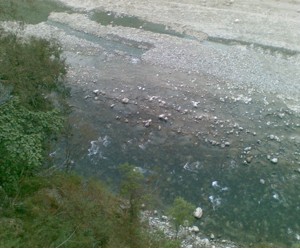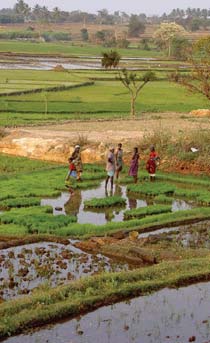/topics/irrigation
Irrigation
New hope for Indian food security? The System of Rice Intensification – A paper by International Institute for Environment and Development
Posted on 29 Oct, 2011 11:43 AMThis paper from the gatekeeper series of the International Institute for Environment and Development (IIED) describes the potential of an innovative rice cultivation practice-the system of rice intensification (SRI)—for allowing Indian rice farmers to not only enhance rice production and their net incomes, but also to solve the water crisis.
Climate change impact on hill agriculture and farmers adaptive strategies – A case study of Kullu valley in Himachal Pradesh
Posted on 26 Oct, 2011 06:35 PMIt takes apple as an indicator crop to investigate the positive and negative effects of climate change on farm economy. The research is a field study to determine the agricultural and socioeconomic impact of climate change on the farmers apple economy of the Kullu valley in Himachal Pradesh, India.
Different designs, same management: A note from Water Initiatives Odisha on Rengali dam and flood management
Posted on 28 Sep, 2011 09:57 AMWater Initiatives Odisha, brings out a special note on this issue in response to the latest spell of the flood disaster in northern Odisha Rivers.
Water conservation through better irrigation
Posted on 26 Sep, 2011 11:30 AMArticle and image courtesy: IndiaWaterReview

The agriculture sector in India, like elsewhere in the world, remains the largest consumer of water. As much as 80-85 per cent of India's available water resources are deployed annually in the agriculture sector, with industry being the second-most largest water consumer. But, contrary to the amount of efforts being put among industrial consumers to bring down their water consumption, agriculturists remain stuck on age-old methods and systems that lead to wastage of water.
So, while industry has been spending money on conducting in house research and development (R&D) to bring down their overall water consumption for making goods and products as well as deploying technologies that treat and reuse water and wastewater better, the agriculture sector has maintained status quo. Across India, farmers are still using flood irrigation methods for their crops. Most of them have not even head of drip irrigation or are so poor that they cannot afford to invest in drip irrigations systems.
Reap what you sow, eat what you grow A film by Suma Josson on urban community farms promoted by Urban Leaves in Mumbai
Posted on 24 Sep, 2011 06:21 PMReap what you sow, eat what you grow - A film by Suma Josson
It depicts how applying ecological principles and practices to maintain soil fertility, to manage crop health, and to keep soil and water in a good condition is especially relevant to the urban setting. The film focuses on the work being done in the urban farms, yet it can be seen as much more than that and, understood as a vision on healthy products, healthy production systems and as a way of life.
Clear the air on Sindhol - WIO urges Government of Odisha
Posted on 17 Sep, 2011 01:47 PM- Is the government really serious about the Project? Water Initiatives Odisha(WIO) apprehends this to be a political game rather than a hydro power project, at least for now.
- We urge upon the government to first clear the air on the project design and other related issues before moving any further.
- The project is uncalled for without making a comprehensive analysis of water and energy scenario of the state; and if it displaces people and submerges agriculture land and forests
Orissa Community Tank Management Project – A paper by World Bank on proposed project restructuring
Posted on 03 Sep, 2011 07:39 PMThis document provides an appraisal of the World Bank financed Orissa Community Tank Management Project. The project on tank rehabilitation in the state was focused on institutional strengthening, agricultural livelihood services and some irrigation improvements in the project area.
Forecasting agricultural output using space, agrometeorology and land based observations
Posted on 03 Sep, 2011 06:29 PMThis document presents the proceedings of the annual review meeting by India Meteorological Department (IMD) on “Forecasting Agricultural Output Using Space, Agrometeorology and Land Based Observations” (FASAL) organized at YASHADA, Pune during 1-2 August 2011.
Adaptive water resource management in the Lower Bhavani project command area in Tamil Nadu – A research report by IWMI
Posted on 25 Aug, 2011 11:07 PM
To what extent farmers and water resource managers already practice adaptive management and whether it is practiced in an optimal manner or could there be areas for improvement based on recent advancements in the theory of adaptive management are some of the questions that are particularly appropriate in the light of rapid changes in river basin water use and also in relation to basin closure.
This paper draws on the development and use of water resources in the Lower Bhavani Project (LBP), with the LBP reservoir and the 84,000 hectare (ha) LBP command area. The project diverts water from the Bhavani River, a tributary of the Cauvery River in Tamil Nadu.
Boundary concepts for interdisciplinary analysis of irrigation water management – A working paper by Peter Mollinga
Posted on 24 Aug, 2011 07:16 PMThe focus is concepts that capture the hybridity of irrigation systems as complex systems, and cross the boundaries of the natural and social sciences.




